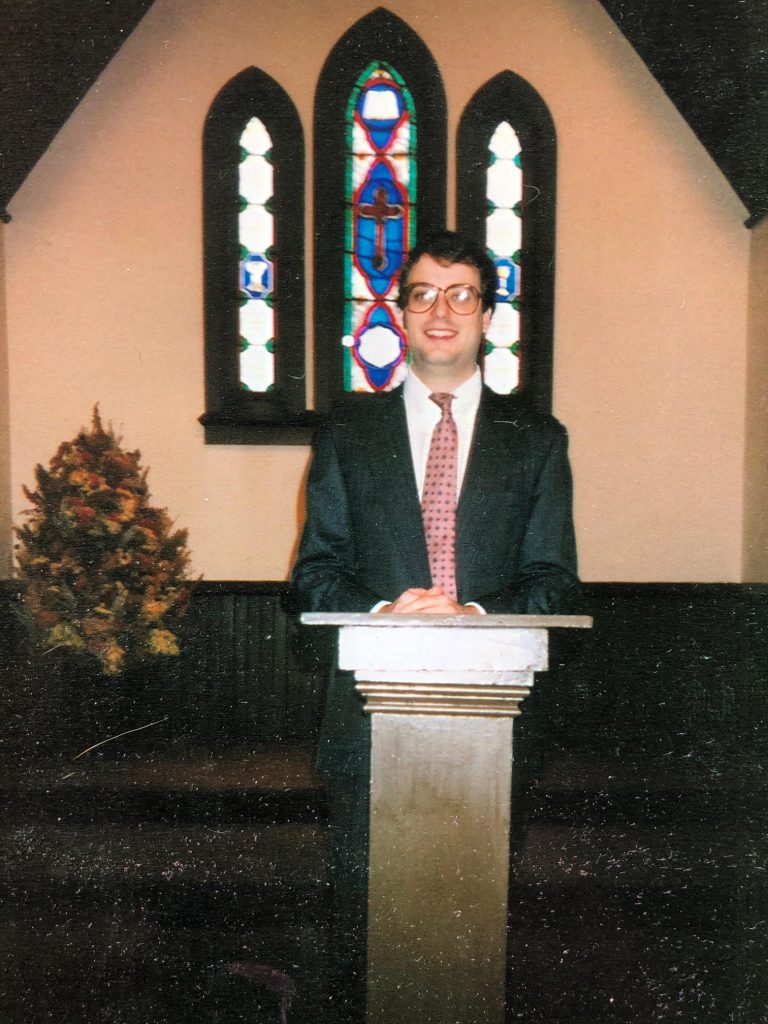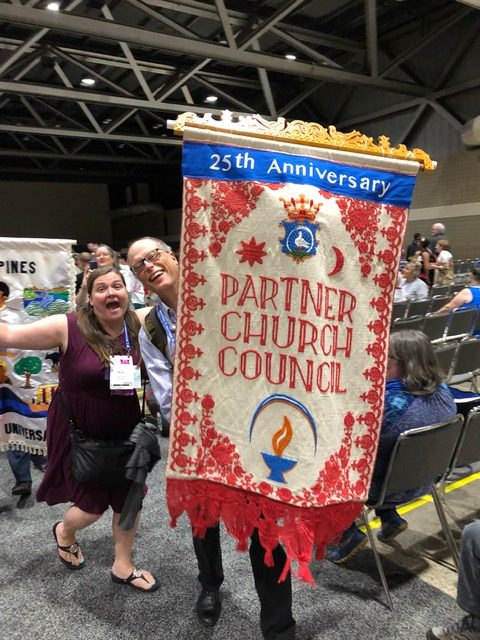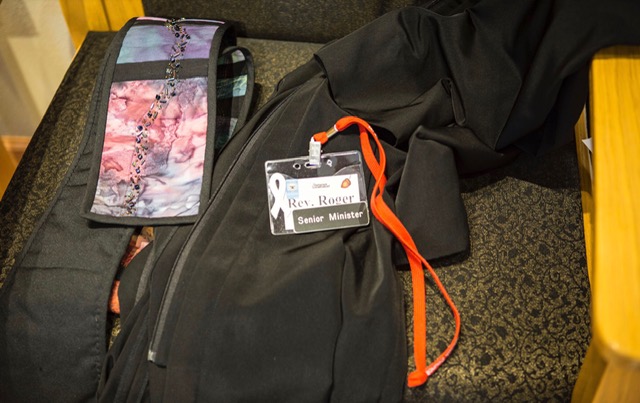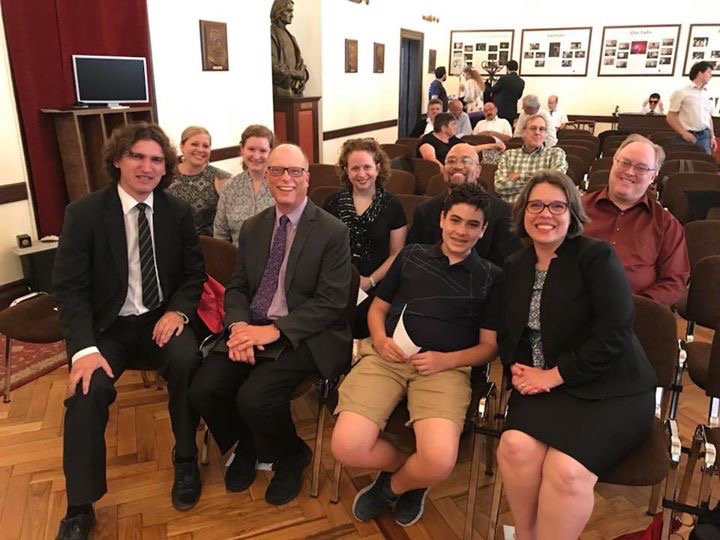
My ministry began in 1988-89 with a quarter-time ministry in the UU Fellowship of Bartholomew County in Columbus, IN, and a full-time chaplaincy serving at a drug and alcohol treatment. Though brief, both played a pivotal role in my still unfolding ministerial formation. The Fellowship took off on a trajectory that led it to having a full-time minister within a decade. In the treatment center, I learned much about pastoral counseling and spirituality through the Twelve Steps program.
In October 1990, I became the first settled minister of the Fox Valley Unitarian Universalist Fellowship in Appleton, WI. Appleton is not where we expect UU congregations to grow a lot. It’s a religiously and politically conservative smaller Midwestern city with a population of around 75,000 (225,000 if you count the surrounding area). It’s the hometown of Joe McCarthy and the headquarters of the John Birch Society. But it grew and grew–until there were 700 when I left in 2015. The Fox Valley UU Fellowship story shows that Unitarian Universalism has a lot more potential in all sorts of areas than we typically think.

Professionally, I was attracted to stay at the Fellowship because the challenges we faced as a congregation continually evolved. It felt like I served at least three distinct congregations in the same place: a small, pastoral-sized congregation; a mid-sized, program congregation; and a large, resource congregation. My ministry included two capital campaigns, building a new facility, adding on a 330-seat sanctuary, and having as many as four services a weekend.
One of the most important chapters of my ministry at the Fellowship was my last one. The Fellowship’s leadership and I were mindful that the first departure of the congregation’s senior minister would establish a pattern for how ministers leave. The year between my giving notice and leaving gave us a good opportunity to learn together about the healthy boundaries that help make a ministerial transition successful.
When I literally laid down my robe and took off my Senior Minister name-tag after my final message at the Fellowship and walked down the aisle and out the door for the drive to St. Louis, we all understood that I was no longer their minister. The congregation had a good two years of interim ministry and then called Rev. Christina Leone-Tracy, a minister very different from me: a woman in her late 30s. The numbers and vibrancy remained steady during the interim and now the congregation is taking off into a new, exciting era with its wonderful senior minister. I have been thrilled to watch this from afar.
I returned for Rev. Christina’s installation and gave the Charge to the Congregation. I returned again in 2019 to be installed as Minister Emeritus. Rev. Christina and I did a joint sermon reflecting on the ministerial transition and the years since I left—for the congregation, for her, and for me. The service and the weekend felt empowering for Rev. Christina’s ministry, healing for those who mourned my departure, and affirming of both my ministry at the Fellowship and the way I departed. It all felt just right.
As time has allowed for the last six years, I have done governance consulting for Unity Consulting. I’ve worked with more than a dozen congregations from coast to coast varying in size from 150 to close to 1,000. Focuses of my work include developing a coherent mission and strategic plan, instituting healthy congregation systems, staff relations, ministerial transition, and right-sizing governance systems. I also do individual governance coaching with ministers. Good governance isn’t the goal of congregational life, but good governance helps a congregation know and fulfill its mission. I believe that congregations need to adapt the governance model they use to fit their values, history, and aspirations–in other words, one size does NOT fit all.

In May 2016, I became the Executive Director of the Unitarian Universalist Partner Church Council (UUPCC). The Fox Valley UU Fellowship had vibrant partnerships with U/U churches in Déva in Transylvania and Banaybanay in the Philippines. Partnering with Déva helped the Fellowship and me deepen our UU identity and sense of Unitarian history. Our partnership with Banaybanay, a rural, isolated village of subsistence farmers, helped us widen our understanding of our UU faith and its attractiveness way beyond our typical and way-too-narrow U.S. UU demographic (white, upper middle and upper class, high educational attainment, etc.).
I enjoyed my work at the UUPCC during these past four years—particularly the chance to connect with and learn from incredible U/U leaders in Transylvania, the Philippines, and Northeast India where most of our 125 overseas partners are located. I felt especially good about my work with our Board to shift the UUPCC from the more patronizing, imperialist roots in the 1990s when we saw ourselves as “rescuing” Transylvanian Unitarians to a more mutual sense of partnership.
In August 2020, I became the Interim Minister of First Unitarian Society in Madison, Wisconsin. The congregation had a challenging first two years of interim ministry after their longtime Senior Minister retired in 2017. They wisely decided to add a third year of transitional ministry. I am honored and delighted to have served the congregation for this past year.
Major focuses of my work have included: assisting and supporting the Search Committee; working with the Board to bring more coherence and maturity to their governance system; developing the role of the Leadership Team that oversees operations; adopting strategic priorities after not having them for many years; clarifying and finalizing a shift in ministry from a solo senior minister with a second minister to co-senior ministers starting in August when the new called minister arrives; and building staff morale. The congregation made excellent progress in all of these areas and is now well-poised for its next era.
My interim ministry in Madison has been challenged by my arriving after the pandemic began and leaving this summer before it’s over. I was able to develop warm relationships with staff and congregants in spite of never meeting most of them face-to-face. Working with our worship team, we vastly improved the quality and appeal of our virtual worship services.



